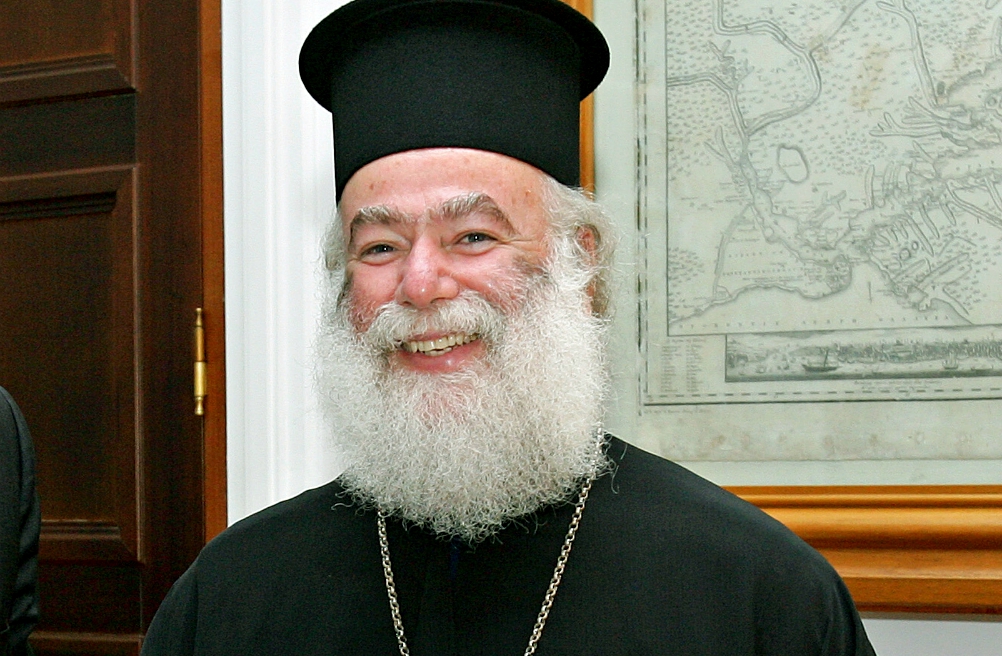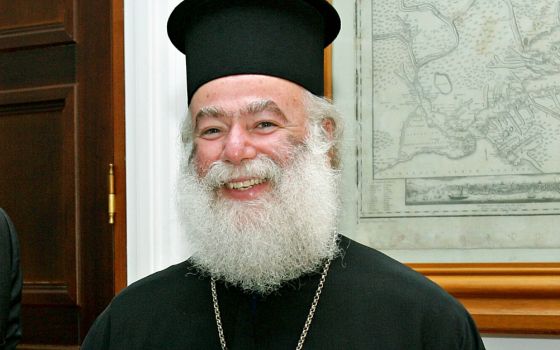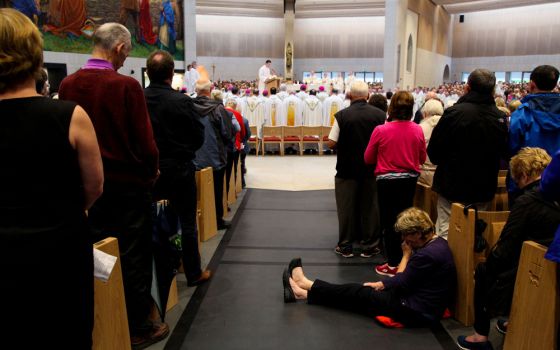
Patriarch of Alexandria Theodoros II (Wikimedia Commons/Greek Ministry of Foreign Affairs)
Advertisement
DEMOCRATS CHALLENGE 'UNLAWFUL' MOVE
Pope Francis has formally recognized that five Franciscan missionaries ministering in what is now the U.S. state of Georgia were killed for their faith.
By signing the decree in the sainthood cause of the Georgia martyrs Jan. 27, the pope cleared the way for their beatification, although a date for the ceremony was not announced immediately.
The Spanish Franciscans Pedro de Corpa, Blas Rodríguez de Cuacos, Miguel de Añón, Antonio de Badajoz and Francisco de Veráscola were killed between Sept. 14 and Sept. 17, 1597, after Father de Corpa told a young Indigenous man, Juanillo, who was heir to a Guale chiefdom, that as a baptized Christian he could not take a second wife.
Juanillo and a band of his men killed the priest with a stone hatchet at the Mission of Our Lady of Guadalupe in Tolomato, which is near modern-day Eulonia, Georgia. They then went after the other Franciscan missionaries living and ministering along the Georgia coast.
Recounting the story of the Georgia martyrs on its website, the Dicastery for the Causes of Saints, said Father de Corpa not only "reprimanded" Juanillo for taking a second wife, but also "told him that he would oppose his succession as village chief if he persisted in his polygamous choice."
Bishop Stephen D. Parkes of Savannah, the diocese that includes the missions where the five friars were martyred, thanked all the people who worked to promote their sainthood cause for more than 40 years.
"May Venerable Friar Pedro de Corpa and Companions intercede for families everywhere, and inspire husbands and wives around the world to live out the sacrament of marriage with love, truth, and fidelity," the bishop wrote in a statement Jan. 27.
The first proof of the five Franciscans' readiness to give their lives for the Lord was their choice "to leave Spain and set out as missionaries to a land and among peoples still partly unknown. The five were aware of the risks and dangers associated with their apostolate also in relation to their safety," the dicastery said.
"Moved by a genuine spirit of love for Christ and service to the church, they accepted to be sent on mission to the North American territory," it said.
Advertisement
Francis signed other decrees Jan. 27 as well, including recognizing:
— The miracle needed for the canonization of Italian Blessed Vincenza Maria Poloni, founder of the Sisters of Mercy of Verona; she lived from 1802-1855.
— The martyrdom of Swiss Marist Brother François Benjamin May, also known as Brother Lycarion, who was shot in Barcelona, Spain, in 1909 during an anarchist rebellion.
— The heroic virtues of Mother Riccarda Beauchamp Hambrough, a longtime assistant to and later successor of St. Mary Elizabeth Hesselblad, who refounded the Bridgettine Sisters; the two hid persecuted Jews, Communists and Poles from the Nazis in Rome during World War II.
— The heroic virtues of Italian Father Quintino Sicuro, a diocesan priest and hermit, who lived 1920-1968.
— The heroic virtues of Italian laywoman Luigia Sinapi, who lived 1916-1978. The Dicastery for the Causes of Saints said that she experienced "numerous supernatural gifts such as precognition of events and situations, bilocation, discernment of spirits and, above all, mystical union with the Lord Jesus, lived in an atmosphere of modesty, humility and service. Many people, including priests, high prelates, politicians and ordinary people came to her for spiritual comfort."
Pope Francis has formally recognized that five Franciscan missionaries ministering in what is now the U.S. state of Georgia were killed for their faith.
By signing the decree in the sainthood cause of the Georgia martyrs Jan. 27, the pope cleared the way for their beatification, although a date for the ceremony was not announced immediately.
The Spanish Franciscans Pedro de Corpa, Blas Rodríguez de Cuacos, Miguel de Añón, Antonio de Badajoz and Francisco de Veráscola were killed between Sept. 14 and Sept. 17, 1597, after Father de Corpa told a young Indigenous man, Juanillo, who was heir to a Guale chiefdom, that as a baptized Christian he could not take a second wife.
Juanillo and a band of his men killed the priest with a stone hatchet at the Mission of Our Lady of Guadalupe in Tolomato, which is near modern-day Eulonia, Georgia. They then went after the other Franciscan missionaries living and ministering along the Georgia coast.
Recounting the story of the Georgia martyrs on its website, the Dicastery for the Causes of Saints, said Father de Corpa not only "reprimanded" Juanillo for taking a second wife, but also "told him that he would oppose his succession as village chief if he persisted in his polygamous choice."
Bishop Stephen D. Parkes of Savannah, the diocese that includes the missions where the five friars were martyred, thanked all the people who worked to promote their sainthood cause for more than 40 years.
"May Venerable Friar Pedro de Corpa and Companions intercede for families everywhere, and inspire husbands and wives around the world to live out the sacrament of marriage with love, truth, and fidelity," the bishop wrote in a statement Jan. 27.
The first proof of the five Franciscans' readiness to give their lives for the Lord was their choice "to leave Spain and set out as missionaries to a land and among peoples still partly unknown. The five were aware of the risks and dangers associated with their apostolate also in relation to their safety," the dicastery said.
"Moved by a genuine spirit of love for Christ and service to the church, they accepted to be sent on mission to the North American territory," it said.






